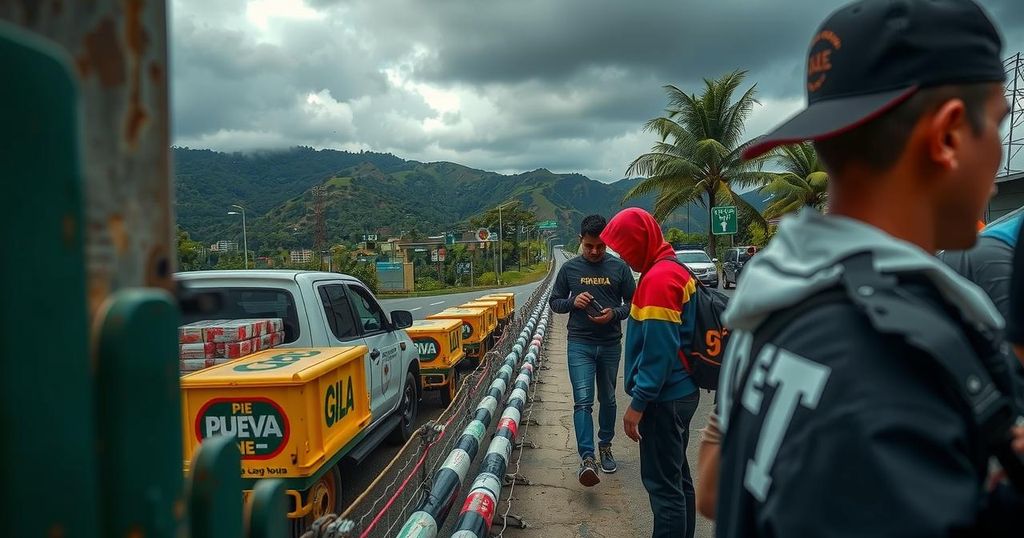Business
economics
BITCOIN MINING, BUSINESS IMPERATIVE CARGO, COLOMBIA, CUBA, CUCUTA, CÚCUTA, DRUG TRAFFICKING, ECONOMY, INSIGHT CRIME, MONEY LAUNDERING, NICOLÁS MADURO, NICOLAS MADURO, NORTE DE SANTANDER, NORTH AMERICA, ORGANIZED CRIME, RON, RONAL RODRÍGUEZ, SOUTH AMERICA, TÁCHIRA, TRADE RELATIONS, UNIVERSIDAD, VENEZUELA
Leila Ramsay
0 Comments
Smuggling Thrives Amid Colombia-Venezuela Border Reopening Challenges
The reopening of the Colombia-Venezuela border has not curtailed smuggling activities; instead, it has intensified the adaptability of criminal networks. These groups continue to exploit illegal routes for trade, largely due to distrust of authorities and the existing economic disparities between the two countries. Increases in extortion and violence have plagued local communities, revealing the complexities of border dynamics in a post-COVID landscape.
As night descends upon Cúcuta, Colombia’s vibrant border city, the darkness provides cover for various illicit activities, particularly smuggling. Illegal paths connecting Cúcuta to Venezuela have transformed into thoroughfares for the transportation of a wide array of goods, often evading law enforcement oversight. A local business leader reflected on this pervasive issue, stating, “While we sleep, countless things happen in the city. And yes, smuggling is one of them.” The border’s closure in February 2019 by President Nicolás Maduro, following failed humanitarian aid attempts, marked a critical point for smuggling operations, turning these clandestine routes, known as “trochas,” into essential conduits for both illicit trade and human trafficking. The challenges posed by the COVID-19 pandemic further solidified these criminal markets, exacerbating their influence in the region. Despite the official reopening of the border on September 26, 2022, which initially stirred hopes for a return to normalcy and reduced smuggling activities, the reality remains stark. Criminal enterprises continue to flourish, adjusting their methods to maintain profitability. Extortion efforts against local communities have notably escalated as these groups seek to compensate for any revenue losses incurred due to decreased smuggling activities. Goods are still transported across the Simón Bolívar and Atanasio Girardot bridges, facilitating trade between Venezuela and Colombia. However, the continuation of smuggling via the trochas remains prevalent as authorities overlook these operations. Estimates prior to the border’s closure indicated trade levels at $7 billion annually in 2008, while post-reopening projections suggested a mere $2 billion in trade for the first year. Current findings indicate that actual figures hover around $1.2 billion. The lingering distrust of Venezuelan authorities remains a barrier impeding the normalization of trade. As observed by Ronal Rodríguez, a researcher at Universidad del Rosario, traders find it easier to rely on illegal paths stating, “With the trochas, there’s just one payment, and the cargo is secure.” Additional impediments include extortion fees at checkpoints and sanctions impacting financial transactions, which further hinder legitimate trade endeavors. Local networks exploit stark price disparities, smuggling essential goods such as food from Colombia into Venezuela. For instance, a liter of milk purchased at $0.90 in Colombia may be sold for nearly double the price in Venezuela, often circumventing basic health standards. Such practices pose significant health risks, compromising food safety for Venezuelan consumers. The dynamics among armed groups along the border have also shifted with the reopening. Groups such as the ELN (Ejército de Liberación Nacional) and Venezuela’s Tren de Aragua have adapted to these changes, impacting the residents of Cúcuta. The ELN continues to profit from extorted fees for using the trochas and from other illegal endeavors. In contrast, Tren de Aragua has diversified its income strategies, increasingly targeting legitimate businesses in Cúcuta for extortion. This shift has contributed to a notable uptick in violence within the region, evidenced by a surge in grenade attacks since 2023 as various criminal factions vie for control of lucrative enterprises. In summary, despite the official reopening of the Colombia-Venezuela border, smuggling networks remain robust, adapting to the realities of the new landscape while the local communities suffer from increased extortion and criminal violence. Migrating from clandestine routes to overt operations, these groups continue to exploit existing vulnerabilities, drawing focus to the broader implications for trade and security in the region.
The Colombia-Venezuela border has long been a hotbed for smuggling and illicit trade, particularly in light of political unrest and economic hardship in Venezuela. President Nicolás Maduro’s decision to close the border in February 2019 significantly amplified these activities, creating an essential infrastructure of tunnels and clandestine paths, known as trochas, utilized by criminal networks. The aftermath of the COVID-19 pandemic further entrenched these operations, as they became increasingly vital for the survival of many Venezuelans facing shortages. The reopening of the border in September 2022 was anticipated to restore normalcy; however, it has instead perpetuated the smuggling economy as distrust in authorities, extortion, and illicit practices continue to prevail.
Ultimately, the reopening of the Colombia-Venezuela border has not diminished smuggling activities as anticipated. Instead, criminal organizations have managed to adapt, finding new avenues for profit while simultaneously increasing their control over local communities through extortion. As the trade dynamics evolve under the persistent influence of armed groups, the implications for regional stability and security remain dire, necessitating a critical examination of approaches to border management and community safety.
Original Source: insightcrime.org




Post Comment